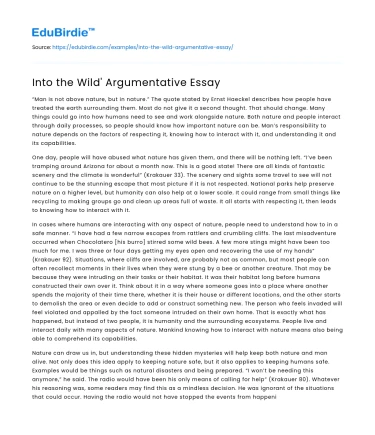“Man is not above nature, but in nature.” The quote stated by Ernst Haeckel describes how people have treated the earth surrounding them. Most do not give it a second thought. That should change. Many things could go into how humans need to see and work alongside nature. Both nature and people interact through daily processes, so people should know how important nature can be. Man’s responsibility to nature depends on the factors of respecting it, knowing how to interact with it, and understanding it and its capabilities.
One day, people will have abused what nature has given them, and there will be nothing left. “I’ve been tramping around Arizona for about a month now. This is a good state! There are all kinds of fantastic scenery and the climate is wonderful” (Krakauer 33). The scenery and sights some travel to see will not continue to be the stunning escape that most picture if it is not respected. National parks help preserve nature on a higher level, but humanity can also help at a lower scale. It could range from small things like recycling to making groups go and clean up areas full of waste. It all starts with respecting it, then leads to knowing how to interact with it.
Save your time!
We can take care of your essay
- Proper editing and formatting
- Free revision, title page, and bibliography
- Flexible prices and money-back guarantee
In cases where humans are interacting with any aspect of nature, people need to understand how to in a safe manner. “I have had a few narrow escapes from rattlers and crumbling cliffs. The last misadventure occurred when Chocolatero [his burro] stirred some wild bees. A few more stings might have been too much for me. I was three or four days getting my eyes open and recovering the use of my hands” (Krakauer 92). Situations, where cliffs are involved, are probably not as common, but most people can often recollect moments in their lives when they were stung by a bee or another creature. That may be because they were intruding on their tasks or their habitat. It was their habitat long before humans constructed their own over it. Think about it in a way where someone goes into a place where another spends the majority of their time there, whether it is their house or different locations, and the other starts to demolish the area or even decide to add or construct something new. The person who feels invaded will feel violated and appalled by the fact someone intruded on their own home. That is exactly what has happened, but instead of two people, it is humanity and the surrounding ecosystems. People live and interact daily with many aspects of nature. Mankind knowing how to interact with nature means also being able to comprehend its capabilities.
Nature can draw us in, but understanding these hidden mysteries will help keep both nature and man alive. Not only does this idea apply to keeping nature safe, but it also applies to keeping humans safe. Examples would be things such as natural disasters and being prepared. “I won’t be needing this anymore,” he said. The radio would have been his only means of calling for help” (Krakauer 80). Whatever his reasoning was, some readers may find this as a mindless decision. He was ignorant of the situations that could occur. Having the radio would not have stopped the events from happening, but could have given him some help if needed. It should not be a one-sided thing of preserving nature, but also knowing how to save human lives from the catastrophic events nature can bring.
Man versus Nature should not be a battle, but a set of differences that people are ready to resolve. Man is responsible for knowing how to admire and protect nature, live alongside it, and its potential, whether catastrophic or not. Man’s duty to nature is to not feel nature is at fault or that it owes something, considering humans are the ones who alter it.






 Stuck on your essay?
Stuck on your essay?

